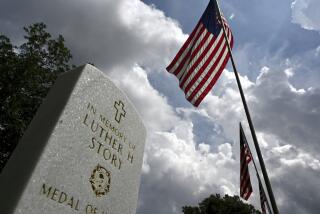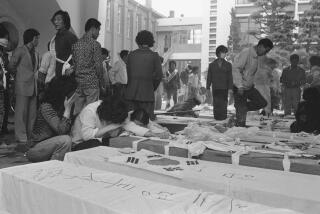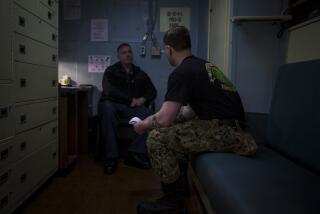Medal of Honor goes to Korean War chaplain
- Share via
WASHINGTON — When men who served in the Korean War with Emil Kapaun describe him, they do not talk about the acts most commonly associated with the Medal of Honor: He fell on no grenades, captured no enemy machine guns, killed no enemy soldiers.
For those who spent time with him in North Korean prison camps, the Army chaplain’s most heroic acts were sharing food he stole from nearby farms, washing men sick with dysentery and persuading many to keep up the brutal struggle for life. Soldiers use words like “kind,” “caring” and “hope” to talk about him and what he imparted.
Kapaun was awarded the U.S. military’s top honor Thursday in a ceremony at the White House, nearly 62 years after his death in captivity.
President Obama called Kapaun “an American soldier who didn’t fire a gun, but who wielded the mightiest weapon of all: a love for his brothers so pure that he was willing to die so that they might live.”
The medal ceremony was the capstone of a six-decade effort that had been confounded by Kapaun’s unusual brand of heroism. His comrades advocating for the honor were successful only after they shifted strategy away from their most vivid recollections of their beloved leader.
The Medal of Honor is reserved for bravery in combat, but for the men who served with him, the chaplain’s true heroism occurred far from a battlefield in the winter of 1950-51.
“He’s personally responsible for saving hundreds of lives, and probably contributed to saving thousands of lives that winter,” said Mike Dowe, an 85-year-old physicist from Texas who was a prisoner with Kapaun. But that was not enough to qualify for the Medal of Honor.
So Dowe and others decided to tout Kapaun’s conduct during a battle with Chinese forces in Unsan, North Korea. Kapaun’s acts during that combat appear on his official Medal of Honor citation:
“When Chinese communist forces viciously attacked friendly elements, Chaplain Kapaun calmly walked through withering enemy fire in order to provide comfort and medical aid to his comrades. When they found themselves surrounded by the enemy, the able-bodied men were ordered to evacuate. Chaplain Kapaun, fully aware of his certain capture, elected to stay behind with the wounded.”
Kapaun, a Catholic priest from Kansas who held the rank of captain, also negotiated with a wounded Chinese commander to save the lives of a group of trapped U.S. soldiers who had become prisoners. And he pushed aside a Chinese soldier who was about to shoot an American, according to the citation.
Those acts gained traction as Medal of Honor material in 2009, when the secretary of the Army sent a favorable recommendation to Congress. Congress needed to pass special legislation to send Kapaun’s recommendation up the chain of command toward the White House because so much time had passed since the war.
Kansas lawmakers shepherded the legislation to passage in early 2012, allowing the Army secretary’s recommendation to proceed to the Department of Defense, where it lingered until early this year.
In January, Sen. Pat Roberts (R-Kan.) called outgoing Defense Secretary Leon E. Panetta to tell him there was “one thing he just had to do” before leaving office — get Kapaun the medal.
Panetta agreed, Roberts said, pushing the request to Obama, who approved it.
On Thursday, the president presented the medal to Ray Kapaun, the chaplain’s nephew, noting that “Father Kapaun has been called a shepherd in combat boots.” Several Korean War veterans, including Dowe, attended.
“These are the people that will finally witness the recognition that he deserves, and they deserve a lot of credit,” Roberts said.
When the veterans reflect on Kapaun’s life, they think less about the brief events of the Unsan battle and more about their long months imprisoned with a man Dowe called “peerless.”
“He’s probably one of the most fantastic people ever to have received the medal,” Dowe said.
Roy Wenzl, a reporter who wrote a book called “The Miracle of Father Kapaun,” said he was a gray-eyed, sandy-haired farmboy with a cleft chin who grew up near the town of Pilsen, Kan., and became a Catholic priest there.
As a boy, Wenzl wrote, Kapaun showed an instinct for kindness, hurrying to help other students with their schoolwork as soon as he finished his own.
Later, in the prison camps, Kapaun often sneaked out of the officers’ section to visit enlisted men. Using pans crafted from scavenged metal, Kapaun boiled snow and bits of grain to make “hot coffee” for the men. He sometimes lighted the contents of a pipe and smoked and prayed with them.
Those gestures are credited with saving men’s lives in the prison camps, where temperatures sometimes dropped to 40 degrees below zero. In his book, Wenzl talks about frostbitten skin falling off prisoners’ fingers and toes, leaving only protruding bones. Some men committed suicide by rolling away from other men with whom they slept.
“You were on a life-support level where you’d just decide you didn’t want to fight that day, and you’d be gone that night,” Dowe recalled.
Dowe was one of 3,000 to 4,000 men who ended up in prison camps in the section of northwest Korea where Kapaun was held. About 1,300 died in the camps, but postwar analyses showed that far fewer died in Sombakol, the camp where Kapaun spent most of the nearly seven months before his death, than in other camps. Dowe and others credit Kapaun for the lower death rate.
Even as the chaplain shrank from around 180 pounds to about 100, Kapaun tended to his fellow prisoners’ physical needs. At night he sneaked out of the camp and stole wood to make the little fires, forbidden by the camp guards. He stole corn, red peppers and pumpkins for the men from nearby farms.
He volunteered for what Dowe called the “most hideous chores,” including picking lice from men too weak to do it themselves and burying dead soldiers. Kapaun removed the dead men’s clothes, washed them, and gave them to other soldiers.
His acts and his unceasing jokes, often peppered with swear words, sustained more than the starving men’s bodies.
All of this made the prison guards hate Kapaun.
“They couldn’t cope with what he was — a free man under God,” Dowe said.
When the chaplain got a blood clot in his leg in the spring of 1951, the men did everything they could to keep him alive. But one day in May the prison guards charged into a room where Kapaun was being kept and hauled him to a hut to die. All the men cried, Dowe said.
Several men have reported a sense of peace after their encounters with Kapaun. In one case, Kapaun walked into a small hut where dying men were kept. A man named Bailey Gillespie was lying there, sick with dysentery. Kapaun blessed him, and Gillespie began to recover.
Stories like Gillespie’s have made Kapaun a candidate for another distinction: Catholic sainthood.
Father John Hotze is investigating Kapaun’s canonization case. Hotze has interviewed 55 people and reviewed many documents, compiling 8,000 pages of information he sent to the Vatican. He is now investigating two miracles people say occurred after they prayed to Kapaun. To qualify for sainthood, Hotze said, a candidate needs to have lived a life of heroic virtue and sanctity.
“My personal impression of him is, there’s no way he cannot be a saint, in what he has done,” Hotze said.
To illustrate, Hotze pointed to Kapaun’s outlook as a prisoner of war:
“You and me, our first thought would be: How am I going to survive? He would look at every day as: What am I going to do to help someone else survive?”
More to Read
Sign up for Essential California
The most important California stories and recommendations in your inbox every morning.
You may occasionally receive promotional content from the Los Angeles Times.













